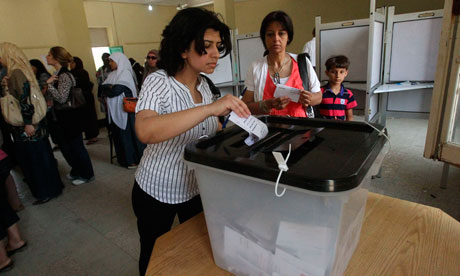
(AFP Photo)
The Supreme Constitutional Court (SCC) ruled the Electoral Districts Law unconstitutional, resulting in the postponement of parliamentary elections until the questioned law is amended.
While the court announced that Article 3 of the law is unconstitutional, it refused other appeals on the law defining political rights issued ahead of the presidential elections last May. It also refused appeals of the law organising the establishment of the parliament. Both laws were passed by former interim president Adly Mansour.
The Supreme Electoral Commission (SEC) announced following the court ruling that the elections will be postponed pending amendments to the districts law.
“The court’s ruling will be sent to administrative court to follow on it and the law will be referred to the authority entitled with diction to amend the law in light of the two courts’ rulings then it will be sent to the President to ratify after revision,” says SEC spokesman Omar Marwan, according to state media.
The commission also said a new time frame for the elections will be set after the law is amended.
President Abdel Fattah Al-Sisi instructed the government to proceed with legislative amendments to the electoral law to abide with the SCC’s ruling within a month, according to a presidential statement.
Al-Sisi asserted that “all legal procedures are to be taken to avoid delaying the third merit”, referring to elections as the last step in the roadmap announced after the Muslim Brotherhood government’s ouster in July 2013.
According to the roadmap put in place following the ouster of former president Mohamed Morsi, parliamentary elections were supposed to take place before presidential elections. But in January 2014, interim president Adly Mansour announced an amendment in the order of elections, which saw Al-Sisi’s inauguration in June.
The Electoral Districts Law was issued by President Abdel Fattah Al-Sisi last December, and includes two sections. Each divides the country into electoral constituencies, according to the two voting systems available: the closed list and the individual list.
The SCC received appeals against the districts law and two other laws: he law defining political rights issued ahead of the presidential elections last May and the law organising the establishment of the parliament.
The laws were mainly contested on claims that they violated constitutional guarantees for equal and fair representation. These include the allocation of parliamentary seats to each electoral constituency, and the expenses allowed for electoral campaigns, which are set to a maximum of EGP 500,000.
“Administrative court will decide that all the procedures the SEC took before the ruling will be annulled,” says Yasser Kasseb head of the Regional Centre for Research and Consultancies (RCRC) explaining the procedure that will follow the SCC’s ruling.
The article that the court ruled unconstitutional defines electoral districts for the individual system seats.
Amending the law to avoid unconstitutionality means the districts for the individual seats, says Kasseb.
Before issuing the verdict Sunday, Egyptian Social Democratic Party’s (ESDP) Secretary General Ahmed Fawzy told Daily News Egypt that his party, in case of the elections’ postponement to amend laws, will propose amendments ensuring more fair laws regarding representation.
Kasseb said that according to the Supreme Court’s ruling, district lists will not change but there is a possibility that the number of seats night change according to changes to the districts.


